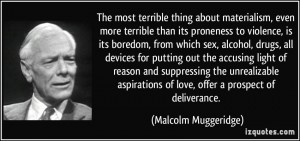My acquisitive yet diligent Mother-in-Law, Ursula, can be heard habitually quoting Ruth Burke, photographer and author of Seabrook, when my seemingly always bored, teenaged stepdaughter is around. The quote, “Only boring people get bored,” echoes in my head as I read the required three articles for the Blog Project this week and now, I find this once fitting quote puzzling. Despite the fact that I have always considered Ursula a materialistic because of her obsession, paranoia, and hoarding tendencies, I never thought of boredom and objects as a possible interconnected relationship.
Csikszentmihalyi (Professor C) claims, in his article, “Why We Need Things,” our “relationship [with objects] is parasitic” and we are being progressively consumed by our “dependence on objects for survival and comfort.” Consequently, I could argue that Professor C inadvertently suggests that the exaggerated statement, “I’m bored,” is a paradoxical result of our reliance on “artifacts.” Therefore, I imply boredom is a cause of our addiction to seek entertainment via objects.

In his essay, “The Secret to Good Writing: It’s about Objects, Not Ideas,” John Maguire labels “today’s kids [as] dumb or just not interested in ideas.” Not only does this provocative statement poorly conceptualizes a whole population of high school students and college freshmen but it also reveals a contradicting claim. For instance, according to his essay, Maguire stresses the importance for students to focus on “concrete reality” and “write physically;” therefore his accusation is irrelevant whether or not “today’s kids” are “interested in ideas” because as the title states, “It’s about Objects, Not Ideas.”
Additionally, object-based writing is successful when not only combined with abstract ideas but as well as relevant material with which one could draw a connection to in order to incorporate feelings and emotions. Although Professor C’s article also differentiates age by means of stereotyping, he declares, “Teenagers are interested…in objects” and those objects behave as their “main mode of expression.”
In other words, the student-writing example Maguire gave at the end of his essay is impractical to “ask freshmen to write about” because only a small population, regardless of age, find this topic remotely interesting. A majority of Teenagers may encounter increased frustration and, consequently, boredom due to the inability to integrate or express emotions about “The relationship between wealth and productivity in a market society.”
My attempts are to express my distaste for Maguire’s word choice of how he characterizes and uses student writers as the “object” of focus in his essay; it is not, however, to attack the content matter to which he writes about. The use of “vivid examples” is almost imperative when writing yet too much focus on teaching students to “approach [abstract ideas] in a concrete way” could possibly trigger unequal weight towards object-obsession and quite possibly continuous boredom. Overall, ideas, whether abstract or concrete, should be encouraged and cultivated in all students because ideas themself are the core reason for a myriad of inventions, studies, cures, etc. To extinguish someone’s curiosity instead of fueling it will only discourage an inquisitive spirit and ultimately lead to bored idle minds fixated on material comfort.

When reading your blog post I was struck by how differently we – you and I – interpret a couple of key points in Maguire’s essay.
Whereas you see him labeling today’s students as “dumb or just not interested in ideas,” I believe he was saying that if we believe today’s students cannot write well, we have two choices: we can either teach them the skills necessary to become good writers or we can believe that they are dumb and not interested in ideas.
Because everyone can relate to a roadside produce stand, Maguire uses that as a concrete example to explain an abstract idea. One does not need to be emotionally connected to a subject to be able to explain it, but one does need to understand the subject to explain it, which I think is at the heart of Maguire’s object-writing reasoning. From my reading of other students’ writing in the peer review process, it seems that when a student does not truly understand what she is writing about, her writing wallows around in the abstract.
Love your last two sentences!